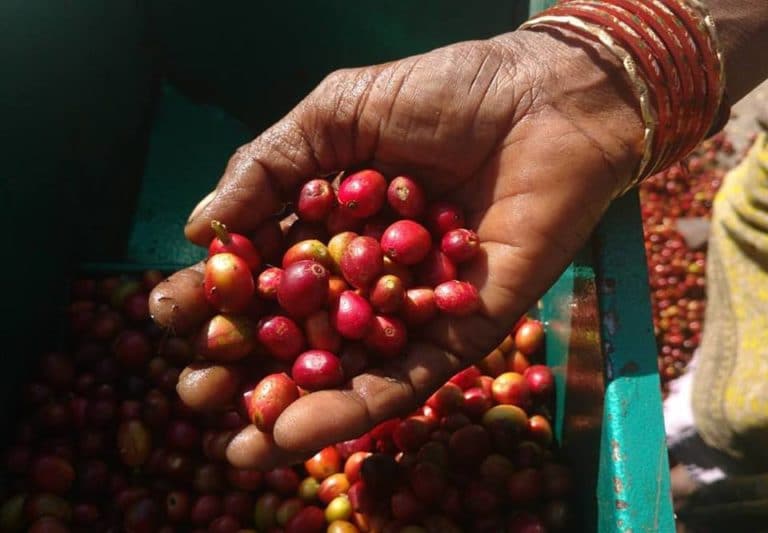What kinds of coffee are there in coffee growing areas in India? Flavor and taste of coffee beans treated by Indian monsoon
When it comes to Indian coffee, you may not be so familiar with it. Let's learn about the four major coffee varieties in India together with Qianjie today.
Kent: Kent was the earliest Arabica variety, selected by British growers of the same name in the 1920s. Until the 1940s, this variety remained popular in growing communities because it was less prone to rust. Today, it is grown in several areas, but it is still known for its exceptional cup quality.

S.795: This is by far the most popular Arabica variety released in the 1940s, with high yield, robust beans, excellent quality and relatively good tolerance to leaf rust. This selection was developed using Kents Arabica coffee and is known for its high quality. Even today, S.795 remains a grower's favorite, a widely cultivated Arabica variety. The S.795 has a balanced cup with subtle mocha flavors.
The Indian wind maraba of Front Street Coffee is the S795 variety, which is treated with monsoon. The acidity of the coffee itself is very low, and the taste is very special. Rich caramel, raisin, herbal flavor, taste a bit like black rice tea, with berry aftertaste.
Cauvery: Commonly known as Catimor, Cauvery is the offspring of a hybrid of Caturra and Hybrido-de-Timer. Caturra is a natural mutant of the famous Bourbon variety. Cauvery thus inherits the high yield and quality attributes of Caturra as well as the resistance of "Hybrido-de-Timer".
Sln.9: Option 9 is a derivative of a hybrid between Ethiopian Arabica coffee series "Tafarikela" and "Hybrido-de-Timer". Sln.9 inherits all of Tafarikela's fine cup qualities. The variety won the Best Arabica Coffee Cup Award in the "Indian Flavor-Cup Test 2002" organised by the Coffee Council of India.

Planting area:
Representing traditional areas of southern Karnataka, Kerala and Tamil Nadu.
Non-traditional areas include Andhra Pradesh and Orissa in the country's Eastern Ghats.
Plantations in the south are the cradle of Indian coffee. Among them is Bababudangiris in Karnataka, known as the birthplace of Indian coffee. The Eastern Ghats and the northeastern states are newly developed coffee areas.
Important Notice :
前街咖啡 FrontStreet Coffee has moved to new addredd:
FrontStreet Coffee Address: 315,Donghua East Road,GuangZhou
Tel:020 38364473
- Prev

The characteristics of Brazilian Coffee beans and the Historical Story of the Development of the characteristics of Brazilian Coffee beans in the New World of Brazil
In terms of production, most coffee lovers recognize four main types of coffee variants, which are the main varieties in the Brazilian coffee industry, namely Typica, Bourbon, Caturra and MundoNovo. Acai this variety is selected from MundoNovo and used in
- Next

Brief introduction of Panamanian 90 + Rosa Manor du Jianning Champion 90 + Rosa Special treated Coffee Bean Flavor
After watching du Jianning's cooking video again yesterday, I couldn't help but write an article about Panama 90 + Rose Summer to consolidate my knowledge. Qianjie is coming to explore with you today. Today, we will focus on 90 + Manor and 90 + Rose Summer Manor. In the 1990s, the manor is the quintessence of the 90 + brand sports world. It is located on the west slope of the Baru volcano, and these places are the first in the world.
Related
- Detailed explanation of Jadeite planting Land in Panamanian Jadeite Manor introduction to the grading system of Jadeite competitive bidding, Red bid, Green bid and Rose Summer
- Story of Coffee planting in Brenka region of Costa Rica Stonehenge Manor anaerobic heavy honey treatment of flavor mouth
- What's on the barrel of Blue Mountain Coffee beans?
- Can American coffee also pull flowers? How to use hot American style to pull out a good-looking pattern?
- Can you make a cold extract with coffee beans? What is the right proportion for cold-extracted coffee formula?
- Indonesian PWN Gold Mandrine Coffee Origin Features Flavor How to Chong? Mandolin coffee is American.
- A brief introduction to the flavor characteristics of Brazilian yellow bourbon coffee beans
- What is the effect of different water quality on the flavor of cold-extracted coffee? What kind of water is best for brewing coffee?
- Why do you think of Rose Summer whenever you mention Panamanian coffee?
- Introduction to the characteristics of authentic blue mountain coffee bean producing areas? What is the CIB Coffee Authority in Jamaica?

